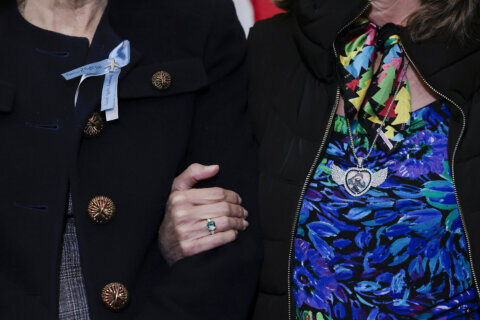Trains arrive every 10 minutes on Metro — more or less. It’s a big improvement from the half-hour wait times riders experienced a little over a year ago after 60% of the rail fleet was sidelined due to the 7000-series derailment.
But Metro still has more work to do, Metro CEO and General Manager Randy Clarke said on WTOP’s DMV Download podcast.
“The frequency in the system is pretty good right now, not to where we need it to be,” Clarke said. “We feel that there’s gonna be another increase this summer. And then [by] the fall, we hope to be back to relay that full Metro service.”
By summer’s end, Metro rail headways would range between five to eight minutes, according to Clarke. But a looming budget threatens these gains.
“We can’t afford to run the service you would get at the end of the summer. We can’t afford to run that the next summer,” Clarke said.
The Washington Area Transit Authority (WMATA) budget is short more than $700 million. That means, unless Metro can secure $3/4 billion for Fiscal Year 2025, wait times are going way up.
“We’re going have massive cuts,” Clarke said. “This is catastrophic stuff — like double what the cuts were going to be during COVID.”
During the pandemic, ridership sunk to record lows. According to a 2021 budget report, the pandemic threatened to bring train wait times to 12 minutes and force earlier closing times for the system. Federal funding kept this from happening, but that money is running out.
For Clarke, the solution is clear: consistent and massive public funding.
“We can’t fare increase out of this,” Clarke said. “We can’t ridership growth our way out of this. It’s just a structural issue … if we don’t solve this soon, eventually this is going to be the biggest disaster in the D.C. region.”
Metro’s CEO said the clock is ticking and, in the next few months, he’s going to cast two different visions to the region, its residents and politicians. One where the budget gap hasn’t been filled, and another where the region’s taxpayers fill the deficit and invests in Metro.
“[What] we’re going to show is two competing versions coming up,” Clarke said. “We’re going to show what the — if you will — death spiral is going to look like, but also what a good vision for this place can be.”
Despite the nearly $1 billion fiscal deficit, Clarke said he’s confident politicians will pay.
“I’m bullish that we’re going to solve this problem,” Clarke said. “Yes, politicians will have to make decisions. But I’ve never met a politician that doesn’t want to make decisions that their constituents don’t value.”
D.C. Ward 6 Council Member Charles Allen, who is Chair of the Committee of Transportation and the Environment, echoed Clarke.
“We’re going to fund and make sure that WMATA is fully funded,” Allen said. “Because it would be insane for us not to.”
But that doesn’t mean the transit agency will get a blank check.
“We need to have good, strong, serious questions and good discussion amongst all the partners around what does that look like?” Allen said.
The offices of D.C. Mayor Muriel Bowser, Virginia Gov. Glenn Youngkin, and Maryland Gov. Wes Moore have not responded to WTOP for comment on Metro’s budget gap and whether they would commit to filling it.








